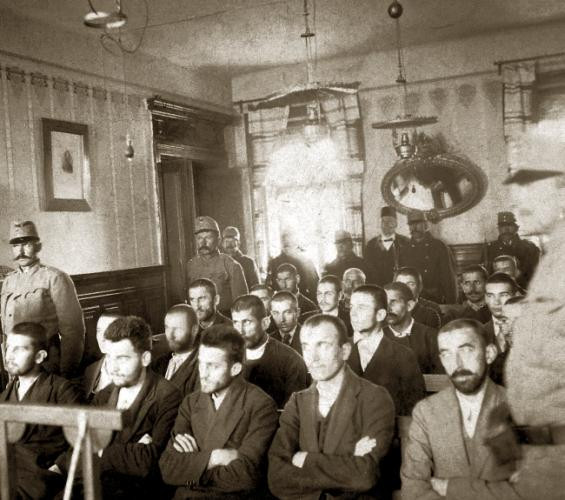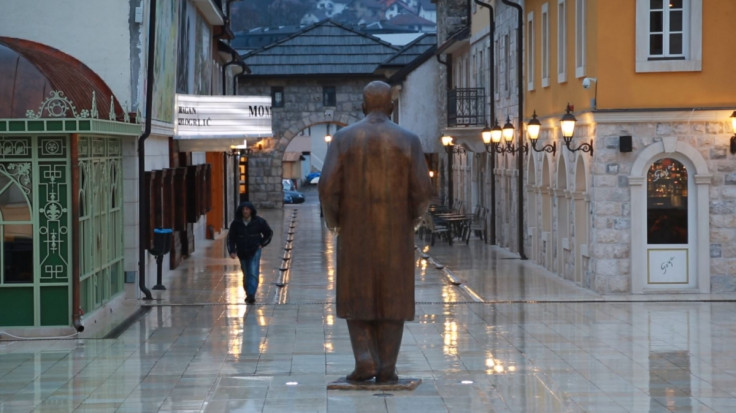Franz Ferdinand Assassination: Serb Leaders Boycott Sarajevo Ceremony to Unveil Gavrilo Princip Tribute in Andricgrad

Serb leaders will shun commemorations in the Bosnian capital Sarajevo for the hundredth anniversary of the assassination of archduke Franz Ferdinand at the hands of Gavrilo Princip, a killing which triggered the catastrophic chain reaction leading to World War I.
Instead, Serbian prime minister Aleksander Vucic and Milorad Dodik, president of the Serb autonomous entity in Bosnia, Republika Srpska, will attend the unveiling of a tribute to Princip - a large mosaic describing the Bosnian-Serb radical as a hero.
The commemoration will take place in the eastern Bosnian town of Visegrad during the opening ceremony of Andricgrad, the controversial and ambitious "town within a town" built by filmmaker Emir Kusturica.
Princip's legacy is still disputed in Bosnia. Celebrated as a hero by Serbs, he is regarded as a terrorist by Croats and Bosnian Muslims. These polarities provide a microcosmic snapshot of the wider divisions in a country which has been divided in two entities along ethnic lines: the Bosnian Federation, formed predominantly by Muslims and Croats and the Serb-dominated Republika Srpska.
In the latter, Serb nationalists are trying to appropriate his legacy and adopt Princip as their poster-boy, portraying him as a selfless pan-Yugoslav idealist who acted to unite the homelands of Orthodox Serbs across Serbia and Bosnia.
Princip, who was just 19 at the time of the assassination and for this reason was spared the death sentence, was exploited along with the other members of the Young Bosnia nationalist movement by the so-called Black Hand to kill the archduke.
A secret Serb military society led by Dragutin Dimitrijević "Apis", the Black Hand organised the assassination attempt, armed the group and so played a crucial role in the start of World War I.
"Dimitrijević was a 'Greater Serbia expansionist' out of the same box as Slobodan Milosevic, and with no compunction about taking steps that were liable to provoke the collapse of the European house of cards, " a Bosnian affairs' expert told IBTimes UK.
Princip: Freedom fighter or Terrorist?
The creation of a Greater Serbia was a project later seized by nationalist Serbs during the Bosnian war of the 1990s. General Ratko Mladic, who stands accused of war crimes in The Hague, said in 2012 during a pre-trial that Princip "gave his life for his people just as I did". During the 1992-1995 war, 100,000 people died and Sarajevo suffered a siege by Serb forces.

Ceremonies in Sarajevo will include a concert of the Vienna Philharmonic orchestra at the city hall (the Vijecnica), which housed the city's library. It was destroyed by artillery shell by Serbs during the war and has only recently been restored.
Earlier this year, Dodik, who had originally been expected to attend the event, announced that no representatives from Republika Srpska would be present.
Serbs claim that a plaque on the city hall commemorating the 1992 bombardment and the loss of 2m books is an insult to the Serbs. The plaque refers to the "Serb criminals" who destroyed the library.
Kusturica, who initiated the Andricgrad project, considers Princip a "freedom fighter" and an "anti-colonial revolutionary" who led to the end of Austro-Hungarian rule over Bosnia.
"The bullet that was fired which killed a man has its social dimension and it was the start of the liberation of the people who lived in Bosnia and Herzegovina from serfdom or from slavery," the film director said at a press conference with Serbian premier Vucic earlier this month, according to Balkan Insight.
The Andricgrad administration said in a statement that "On St Vitus Day, June 28, Serb people from both sides of [the River] Drina, the state heads of Republika Srpska and Serbia, and thousands of prominent attendees from all over the world will mark the centenary of the start of the Great War at this place".
Andricgrad
A joint project between Kusturica (which has 51% of the share) and the government of Republika Srpska, the Serbian enclave carved out after the 1992-95 war, the complex cost between €10m and €12m.

The project is controversial to say the least as it has been developed# on the site of a sports centre that was used as a detention camp during the war. About 3,000 Bosnian Muslims were killed in Visegrad on or near the 11-arch bridge.
Before the war 63% of the town's 25,000 inhabitants were Bosnian Muslims. Despite the Dayton Peace Agreement, which called for the Bosnian Muslims (known as Bosniaks) to be able to return to their homes, only around 5% have come back.
Bosniak activists such as Bakira Hasecic, who was raped at Visegrad police station by Serb paramilitary leader Milan Lukic and after the war founded the Association of Women Victims of War, say they would never put a foot in Kusturica's fantasy town.
"I would never enter Andricgrad even if my life depends on it," she told IBTimes UK in April. "On 26 May 1992 along [what has become] the access road to Andricgrad, the first buses for Bosnian Muslims who were forced into exile [by Serb forces] used to pass. In the sports centre where we took our kids to play there was the biggest concentration camp for Bosniaks."
© Copyright IBTimes 2024. All rights reserved.







